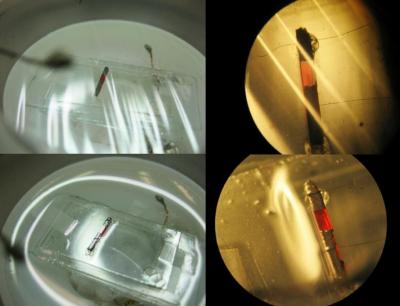A scientist from Rutgers University Vitaly Podzorov is conducting experiments to make plastic electronics more effective. The scientist drew inspiration from a kitchen gadget used to vacuum seal a food package.
 This image shows fabricating single crystal organic field-effect transistors using ultra-thin polymer membrane for a gate insulator. In the upper row, the membrane is stretched over the transistor before vacuum is applied. In the lower row, the vacuum has been applied and the membrane is adhering to the organic crystal. Photos on the right are close-up views of the transistor, with the organic semiconductor crystal in red. Credit: H. T. Yi, et. al., Rutgers University
This image shows fabricating single crystal organic field-effect transistors using ultra-thin polymer membrane for a gate insulator. In the upper row, the membrane is stretched over the transistor before vacuum is applied. In the lower row, the vacuum has been applied and the membrane is adhering to the organic crystal. Photos on the right are close-up views of the transistor, with the organic semiconductor crystal in red. Credit: H. T. Yi, et. al., Rutgers University
Using the inspiration as a basis, the scientist and his team, suspended a polymer membrane on an organic crystal and created a vacuum below. This caused the membrane fall gently and evenly on the crystal surface. This in turn resulted in a smooth interface between the gate insulator and the organic semiconductor, which was free of defects.
The research team has also established that the membranes can be removed and applied again a number of times without affecting the surface. Traditionally silicon semiconductor processing was used for organic transistor fabrication. However these methods had the potential to damage the surface since it resulted in high energy or temperature levels. The method invented by Podzorov can be applied immediately by students at the classroom level where students can apply this technology to build devices and watch them work in one lab session. Funding for the research is provided by the Rutgers Institute of Advanced Materials and Devices for Nanotechnology and the U.S Department of Energy. The vacuum chamber for the experiment was custom made by the machine shop of the department.